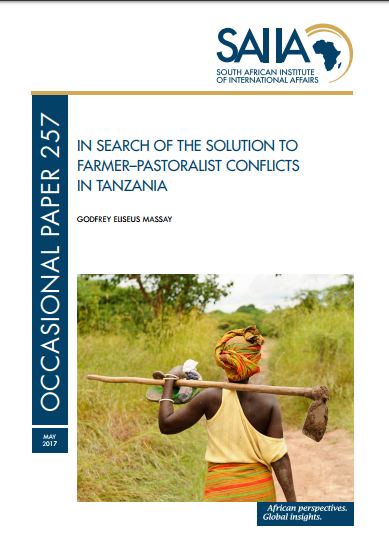South African Institute of International Affairs
Members:
Resources
Displaying 1 - 5 of 20IN SEARCH OF THE SOLUTION TO FARMER–PASTORALIST CONFLICTS IN TANZANIA
Land-use conflict is not a new phenomenon for pastoralists and farmers in Tanzania with murders, the killing of livestock and the loss of property as a consequence of this conflict featuring in the news for many years now. Various actors, including civil society organisations, have tried to address farmer–pastoralist conflict through mass education programmes, land-use planning, policy reforms and the development of community institutions. However, these efforts have not succeeded in the conflict. Elsewhere in sub-Saharan Africa traditional systems are not making much headway either.
In search of the solution to farmer–pastoralist conflicts in Tanzania
Land-use conflict is not a new phenomenon for pastoralists and farmers in Tanzania with murders, the killing of livestock and the loss of property as a consequence of this conflict featuring in the news for many years now. Various actors, including civil society organisations, have tried to address farmer-pastoralist conflict through mass education programmes, land-use planning, policy reforms and the development of community institutions. However, these efforts have not succeeded in the conflict.
Integrated marine and coastal management in the western Indian Ocean: towards a sustainable oceans economy
The Western Indian Ocean (WIO) region has valuable and diverse coastal and marine resources, but much of its natural capital is either threatened or declining. The WIO encompasses rich diverse tropical and subtropical areas along the coastlines of Somalia, Kenya, Tanzania, Mozambique and South Africa. This region also comprises vast oceanic areas and the island states of Madagascar, Seychelles, Comoros, Mauritius and Réunion. This paper focuses on the marine and coastal governance of mainland states in the region.
Can workplace secondments build trust in the mining sector?
Mutual suspicion has characterised the relationship between the South African government and mining companies, particularly in recent years. Resolving the current impasse would require a panoply of policy interventions because of the complexity and age of the mining industry. This briefing proposes that one such intervention could be the introduction of a structured workplace secondment programme between the Department of Mineral Resources (DMR) and mining companies – together identifying critical areas for co-operation and skills transfer.
Civil society’s role in shaping Zimbabwe’s diamond governance
Zimbabwe confirmed that alluvial diamonds had been discovered in the Marange area in Mutare District in 2006. However, as in many otherAfrican countries, the promise diamond mining holds for economic growth has been eroded by a lack of transparency and accountability. The country’s diamond sector has been bedevilled by smuggling, opaque licensing, human rights abuses, self-enrichment by executives and public officials, and extremely limited accrual of diamond revenues to the fiscus, among others.



